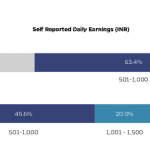When Economies Turn Down, Entrepreneurs Turn Up: How COVID-19 Has Spurred Nigerian Businesses to Build for an Inclusive Future
The COVID-19 pandemic hasn’t been easy on enterprises, regardless of their country. Entrepreneurs around the world spent 2020 navigating the effects of both the economic and healthcare crises on their businesses.
But these crises have had a particularly harsh impact on companies in emerging markets. In Nigeria, for instance, founders of high-growth startups and scaleups had to launch or grow their businesses within the context of a fragile economic recovery and a government with limited fiscal space to provide support for them.
COVID-19’s Impact on Nigeria’s Innovation Ecosystem
In April 2020, when lockdown measures came into effect in several states across Nigeria, it quickly became clear that the country’s innovation ecosystem would be negatively impacted by the crisis, due to diminishing cash runways and interrupted fundraising efforts. A survey conducted by the UK-Nigeria Tech Hub revealed that nearly eight out of 10 Nigerian startups had less than six months of runway.
At the time, as Managing Director of Endeavor in Nigeria, I wrote an op-ed urging the government and other stakeholders to provide tailored support for startups and scaleups in Nigeria. Later in the year, we released a whitepaper detailing the measures that could be taken to provide this support. The solutions we advocated included liquidity support for entrepreneurs, capital injection into the innovation ecosystem and government support for technology businesses driving digital transformation. This approach was motivated by Endeavor’s core belief that high-growth startup and scaleup companies, led by high-impact entrepreneurs, are the key to a vibrant economic future. These companies contribute to ecosystem development and innovation, and create thousands of jobs.
For Nigeria’s informal economy, the pandemic has been equally devastating. Many of these jobs cannot be carried out online, negatively impacting countless entrepreneurs and laborers, and exposing inequalities both domestically and globally. It is likely that we will never know the quantifiable impact of COVID-19 on the country’s informal sector, but it brought to light the urgent need to create infrastructure that can enable Nigerians to thrive in the new digital world.
How Tech-Driven Startups are Responding to the Pandemic
This is where the innovation ecosystem – led by high-growth, technology-driven startups and scaleups – comes in. Endeavor’s global footprint means that we’ve been lucky enough to have front row seats to witness how entrepreneurs across the world — in 38 markets on six continents — have proactively tackled COVID-19’s challenges head-on. For many businesses, the pandemic has revealed weak spots, areas for improvement and inefficient processes. For Nigeria’s startups and scaleups, it has also provided an opportunity to accelerate the digitisation of the country.
When the country’s initial lockdown was announced last April, millions of small businesses had to shut down their operations. In response, Flutterwave, a payments technology platform, helped hundreds of small business owners by releasing an e-commerce platform to enable them to set up their shops online, with payments and delivery integrated into the platform. The logistics platform Kobo360—which matches shippers and truck operators to confirm, finance and complete long-haul trips— also saw an opportunity in the crisis, as online commerce was increasing under lockdown, and companies found it easier to work with a fully digital platform. It has experienced increased usage and has doubled the value of trips on its platform to close to $200 million annually. And as markets closed and retailers struggled to source supplies for their stores, many of them turned to TradeDepot, a scaleup company that is digitising Nigeria’s supply chain. During periods of restricted movement, the 40,000 retailers on TradeDepot’s platform were able to order essential supplies via SMS texts, USSD codes or the company’s website. TradeDepot even became part of Lagos State’s emergency food response strategy, distributing essential products to designated markets during the nationwide lockdown.
When lockdown restrictions were eased and banks re-opened, images of crowded bank gates were common on social media, as social distancing and other safety measures slowed their services. One bank that did not have to deal with such crowds was Kuda bank. As a digital-only bank, Kuda has no branches: This pandemic-friendly feature helped to power its rapid growth, leading to a $10 million seed round in November -– the largest seed round raised so far in Africa. And in the second quarter of last year, mobile payments platform Paga reported over 330% quarter-on-quarter growth in new signups for its mobile wallet, which it attributed to the pandemic.
Beyond these tech-enabled solutions to social distancing measures, scaleups have also made more direct contributions to Nigeria’s crisis response. For instance, when the country’s COVID-19 testing capacity needed to scale rapidly, 54gene and LifeBank quickly launched mobile testing facilities to support the government.
At Endeavor, we say that when economies turn down, entrepreneurs turn up. Companies like Google, Facebook, Uber and AirBnB were launched during (or just before) periods of economic turmoil. Just like their peers in other countries, in the middle of the current healthcare and economic crises, Nigerian entrepreneurs have turned up. Their innovations have saved lives, created jobs and contributed to economic prosperity. In the early days of the pandemic, we worried about the effects it would have on young businesses’ cash positions and ability to fundraise. While we can never know what would have happened if there wasn’t a pandemic, startups in Africa raised $1.6 billion in 2020, according to ecosystem analyst Maxime Bayen. This is more than they raised in 2019.
The COVID-19 crisis has devastated lives and livelihoods, but it has also re-shaped our way of living in more positive ways, by changing our habits and digitising the economy. It is nearly impossible to counterbalance the emotional, mental and physical toll that many of us have faced this past year – let alone the lives that have been lost. Yet the looming presence of a global health crisis has pushed Nigeria’s technology companies to innovate, and forced us to imagine alternative ways of living and conducting business. If there could be a bright side to such a dark time, this would certainly qualify.
Eloho Omame is the Managing Director and CEO of Endeavor in Nigeria.
Photo courtesy of Olumide Bamgbelu.
- Categories
- Coronavirus
- Tags
- COVID-19, innovation, scale, startups





